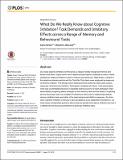What do we really know about cognitive inhibition? Task demands and inhibitory effects across a range of memory and behavioural tasks
Abstract
Our study explores inhibitory control across a range of widely recognised memory and behavioural tasks. Eighty-seven never-depressed participants completed a series of tasks designed to measure inhibitory control in memory and behaviour. Specifically, a variant of the selective retrieval-practice and the Think/No-Think tasks were employed as measures of memory inhibition. The Stroop-Colour Naming and the Go/No-Go tasks were used as measures of behavioural inhibition. Participants completed all 4 tasks. Task presentation order was counterbalanced across 3 separate testing sessions for each participant. Standard inhibitory forgetting effects emerged on both memory tasks but the extent of forgetting across these tasks was not correlated. Furthermore, there was no relationship between memory inhibition tasks and either of the main behavioural inhibition measures. At a time when cognitive inhibition continues to gain acceptance as an explanatory mechanism, our study raises fundamental questions about what we actually know about inhibition and how it is affected by the processing demands of particular inhibitory tasks.
Citation
Noreen , S & MacLeod , M D 2015 , ' What do we really know about cognitive inhibition? Task demands and inhibitory effects across a range of memory and behavioural tasks ' , PLoS One , vol. 10 , no. 8 , 0134951 . https://doi.org/10.1371/journal.pone.0134951
Publication
PLoS One
Status
Peer reviewed
ISSN
1932-6203Type
Journal article
Description
The authors (SN, principal investigator and MDM as co-investigator) received funding from the British Academy for this research (http://www.britac.ac.uk/). The grant number was SG111104.Collections
Items in the St Andrews Research Repository are protected by copyright, with all rights reserved, unless otherwise indicated.
Related items
Showing items related by title, author, creator and subject.
-
What, where and when : deconstructing memory
Marshall, Rachael; Hurly, T.Andrew; Sturgeon, Jenny; Shuker, David Michael; Healy, Susan Denise (2013-12-07) - Journal articleThe ability of animals to remember the what, where and when of a unique past event is used as an animal equivalent to human episodic memory. We currently view episodic memory as reconstructive, with an event being remembered ... -
Provide all the details that you can remember : assessing the quantity and quality of autobiographical retrieval
Lucaciu, Irina-Maria (University of St Andrews, 2018-12-06) - ThesisPeople asked to recall the memory of an event during testimony are encouraged to prioritize both quantity and quality – "the whole truth and nothing but the truth". Extensive research has shown that people can provide ... -
Cognitive and neural processes underlying memory for time and context
Persson, Bjorn Martin (University of St Andrews, 2017-06-20) - ThesisThe aim of this thesis is to examine the underlying cognitive and neural processes at play during retrieval of temporal and contextual source information. This was assessed across three experimental chapters. In the first ...

